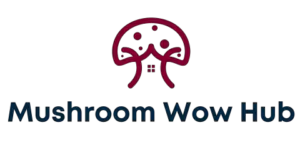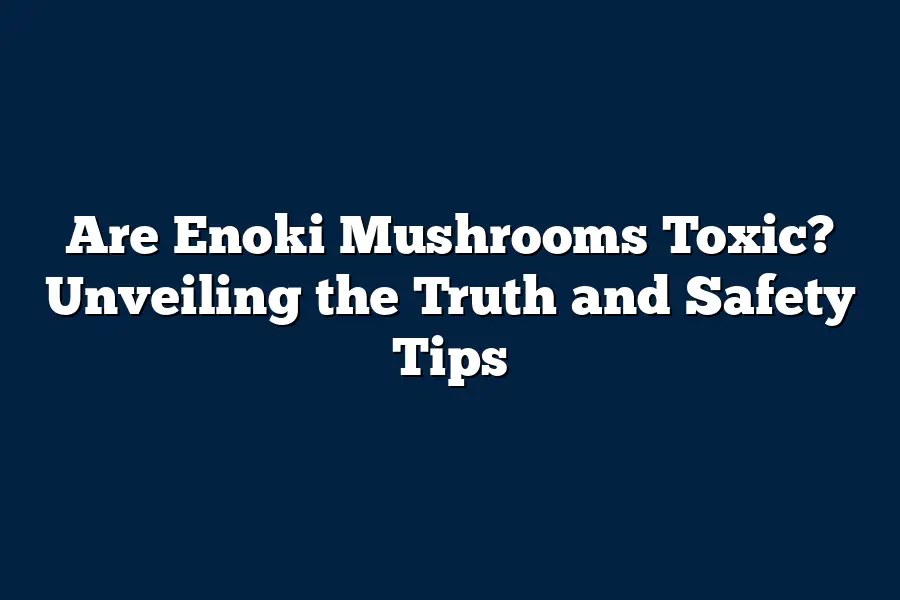Enoki mushrooms are not toxic when consumed raw or cooked properly. However, it’s important to note that some individuals may have allergic reactions to certain types of mushrooms. To ensure safety, always purchase enoki mushrooms from reputable sources, cook them thoroughly, and consume them in moderation as part of a balanced diet. If you have concerns about mushroom allergies, it’s best to consult with a healthcare professional.
Enoki mushrooms: delicate in appearance, but are they toxic?
Let’s uncover the truth and safety tips together in this comprehensive guide.
Let’s ensure your culinary adventures with enoki mushrooms are both delicious and safe.
Table of Contents
Understanding Enoki Mushrooms: Exploring Potential Risks
When it comes to enoki mushrooms, one burning question that often arises is whether they pose any toxicity risks to consumers.
Let’s delve into the realm of enoki mushrooms to unravel the truth behind their safety profile.
Not Inherently Toxic: Debunking the Myth
Enoki mushrooms, scientifically known as Flammulina velutipes, are popular for their crunchy texture and mild flavor.
These mushrooms are commonly used in Asian cuisine and are a versatile ingredient in various dishes.
Contrary to popular belief, enoki mushrooms are not inherently toxic.
In fact, when properly cultivated and consumed in moderation, enoki mushrooms can offer a range of health benefits.
Potential Risks: Understanding the Concerns
While enoki mushrooms themselves are not toxic, there are potential risks associated with their consumption.
One of the primary concerns is the presence of a compound called hydrazine, which is found in varying levels in certain mushrooms, including enoki mushrooms.
Hydrazine is a naturally occurring chemical that has been linked to adverse health effects in high concentrations.
Therefore, it is important to exercise caution when consuming enoki mushrooms, especially in large quantities.
Mitigating Risks: Safe Consumption Practices
To mitigate any potential risks associated with enoki mushrooms, here are some safe consumption practices to keep in mind:
- Cook Thoroughly: Cooking enoki mushrooms thoroughly can help break down harmful compounds and reduce any potential health risks.
- Moderation is Key: As with any food, moderation is key. Consuming enoki mushrooms in small quantities as part of a balanced diet is unlikely to pose any significant health concerns.
- Source from Reputable Suppliers: Ensure that you source your enoki mushrooms from reputable suppliers who follow proper cultivation and handling practices to minimize the risk of contamination.
while enoki mushrooms are not inherently toxic, it is essential to be aware of the potential risks associated with their consumption.
By understanding these risks and following safe consumption practices, you can continue to enjoy the unique flavor and culinary versatility that enoki mushrooms have to offer without compromising your health.
Stay tuned for more insights into the world of enoki mushrooms and how you can incorporate them into your culinary repertoire safely and deliciously.
Safety Precautions for Handling and Cooking Enoki Mushrooms
When it comes to enjoying enoki mushrooms, safety is key.
Proper handling and cooking techniques are essential to ensure a delightful culinary experience without any health risks.
Let’s dive into some safety precautions you should keep in mind:
Proper Handling Techniques
Washing Thoroughly: Before incorporating enoki mushrooms into your dishes, make sure to wash them thoroughly under running water. This helps remove any dirt or debris that may be present.
Inspecting for Freshness: Check the mushrooms for any signs of spoilage, such as sliminess or discoloration. Fresh enoki mushrooms should have a firm texture and a crisp appearance.
Storing Correctly: To maintain the freshness of enoki mushrooms, store them in the refrigerator in a paper bag. Avoid storing them in plastic, as it can cause moisture buildup and lead to spoilage.
Cooking Techniques
Cooking Thoroughly: It’s important to cook enoki mushrooms thoroughly before consuming them. Cooking helps break down any potential toxins and ensures the mushrooms are safe to eat.
Avoiding Raw Consumption: Due to the risk of contaminants, it’s best to avoid consuming enoki mushrooms raw. Cooking them at a high temperature can help eliminate any harmful bacteria.
Trimming the Roots: Before cooking, trim the roots of the enoki mushrooms to remove any dirt or debris that may be attached. This simple step can help improve the overall cleanliness of the mushrooms.
Additional Safety Tips
Avoiding Cross-Contamination: When handling enoki mushrooms, be mindful of cross-contamination with other foods. Use separate cutting boards and utensils to prevent the spread of bacteria.
Following Cooking Guidelines: Always follow recommended cooking guidelines when preparing enoki mushrooms in dishes. Proper cooking times and temperatures are crucial for ensuring food safety.
By following these safety precautions for handling and cooking enoki mushrooms, you can savor their delicate flavor and unique texture with peace of mind.
Remember, prioritizing safety in the kitchen is the first step towards enjoying a delicious and wholesome culinary experience.
Uncovering the Nutritional Value of Enoki Mushrooms
When it comes to enoki mushrooms, the topic of their potential toxicity often takes center stage.
However, amidst the discussions about risks, it’s essential not to overlook the significant health benefits these mushrooms can offer.
Let’s dive into the nutritional value of enoki mushrooms to get a better understanding of their positive aspects.
The Balancing Act: Risks vs. Benefits
Enoki mushrooms, also known as Flammulina velutipes, may pose risks if not cooked thoroughly due to the presence of certain harmful bacteria.
However, when handled and prepared properly, these mushrooms can be a valuable addition to a nutritious diet.
Nutrient Powerhouse
Enoki mushrooms boast a range of essential nutrients that can contribute to overall health and well-being.
These delicate mushrooms are packed with vitamins and minerals, including:
- Vitamin B3: Plays a crucial role in energy production and metabolism.
- Vitamin B5: Supports the body’s ability to convert food into energy.
- Vitamin B9 (Folate): Essential for cell division and DNA synthesis.
- Vitamin D: Helps maintain bone health and supports the immune system.
- Copper: Aids in the formation of red blood cells and supports iron absorption.
- Potassium: Important for heart health and proper muscle function.
Supporting Evidence
According to a study published in the Journal of Agricultural and Food Chemistry, enoki mushrooms contain bioactive compounds with potential health benefits.
These compounds exhibit antioxidant and anti-inflammatory properties, which can help combat oxidative stress and inflammation in the body.
Incorporating Enoki Mushrooms into Your Diet
To reap the nutritional benefits of enoki mushrooms while minimizing any potential risks, consider the following tips:
Cook Thoroughly: Properly cooking enoki mushrooms can help reduce the risk of harmful bacteria, making them safer to consume.
Versatile Cooking Options: Incorporate enoki mushrooms into stir-fries, soups, salads, or as a topping for various dishes to enjoy their unique flavor and texture.
Pair with Balanced Ingredients: Combine enoki mushrooms with a variety of vegetables, proteins, and grains to create well-rounded and nutritious meals.
While it’s crucial to be aware of the potential risks associated with enoki mushrooms, their nutritional value and health benefits should not be overlooked.
By understanding how to safely handle and prepare these mushrooms, you can harness their nutrient-rich profile to enhance your culinary repertoire and support your overall well-being.
Stay tuned for more insights into the world of enoki mushrooms and how they can fit into a balanced diet.
Recognizing Signs of Spoilage – How to identify if enoki mushrooms are no longer safe to eat
Hey there mushroom enthusiasts!
Today, we’re diving into the important topic of recognizing signs of spoilage in enoki mushrooms.
As much as we love these delicate fungi, it’s crucial to know when they’re past their prime to avoid any adverse effects on our health.
Let’s explore how to identify if your enoki mushrooms are no longer safe to eat.
1. Visual Cues
The first step in determining the safety of your enoki mushrooms is to visually inspect them.
Keep an eye out for the following signs of spoilage:
- Slime: If you notice a slimy texture on the mushrooms, it’s a clear indication that they have started to spoil.
- Discoloration: Any discoloration, such as dark spots or browning, is a red flag that the mushrooms are no longer fresh.
- Mold: The presence of mold, either on the mushrooms or in the packaging, signals spoilage and should be avoided at all costs.
2. Smell Test
Don’t underestimate the power of your sense of smell!
Give your enoki mushrooms a whiff to detect any off-putting odors that could indicate spoilage.
If you detect a sour or foul smell, it’s best to discard the mushrooms.
3. Texture Check
Another important aspect of assessing enoki mushrooms for spoilage is their texture.
Here’s what to look out for:
- Sliminess: Mushrooms that feel excessively slimy to the touch have likely started to break down and are no longer safe to eat.
- Mushiness: A mushy or soft texture indicates that the mushrooms have deteriorated and should be avoided.
4. Expiration Date
Always check the expiration date on the packaging of your enoki mushrooms.
Consuming mushrooms past their expiration date significantly increases the risk of foodborne illness.
When in doubt, it’s better to err on the side of caution and dispose of them.
keeping a keen eye out for visual cues, conducting a smell test, checking the texture, and being mindful of the expiration date are essential steps in determining if your enoki mushrooms are safe to eat.
Remember, when in doubt, it’s best to throw them out to protect your health.
Stay tuned for more mushroom-related tips and tricks!
Let’s keep our fungi adventures safe and delicious.
Final Thoughts
While enoki mushrooms are not inherently toxic, it’s crucial to handle and cook them with care to minimize potential risks.
By understanding the safety precautions and following proper cooking techniques, you can enjoy the nutritional benefits these delicate mushrooms offer without worry.
Remember to keep an eye out for signs of spoilage to ensure you’re consuming them safely.
Now armed with this knowledge, take on the kitchen with confidence and savor the unique taste of enoki mushrooms in your favorite dishes.
Happy cooking!

